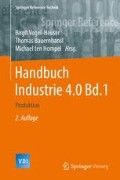Zusammenfassung
Durch die fortschreitende Technisierung und Automatisierung industrieller Prozesse im Zuge der vierten industriellen Revolution stellt sich immer häufiger die Frage, was der Mensch in der Fabrik von Morgen für eine Rolle spielt. Damit er nicht als Fremdkörper, sondern als steuernder sowie als überwachender Akteur in diese modernen Prozesse eingebunden wird, bedarf es innovativer und adaptiver Benutzerschnittstellen. Augmented Reality (AR) erlaubt es, dem Benutzer Informationen situationsabhängig dort anzuzeigen, wo sie benötigt werden: Direkt im Blickfeld und auf dem betreffenden Objekt. Innerhalb des Forschungsprojektes SmARPro wird ein System entwickelt, das Informationen kontext- und rollenbasiert aufbereitet und über Augmented Reality dem Benutzer zur Verfügung stellt.
Access this chapter
Tax calculation will be finalised at checkout
Purchases are for personal use only
Literatur
Allrutz R, Cap C, Eilers S, Fey D, Haase H, Hochberger Ch, Karl W, Kolpatzik B, Maehle E et al (2003) Organic Computing – Computer- und Systemarchitektur im Jahr 2010 (VDE/ITG/GI-Positionspapier, VDE – Verband der Elektrotechnik, Elektronik, Informationstechnik e.V., Frankfurt)
Backhaus K, Voeth M (2010) Industriegütermarketing. 9. Aufl. Vahlen, München
BMW Group (2015) Mini Augmented Vision. (Pressemitteilung am 10.04.2015 in München)
Card S, Moran TP, Newell A (1983) The psychology of human computer interaction. Lawrence Erlbaum Associates, Hillsdale
Davis F (1985) A technology acceptance model for empirically testing new end-user information systems – theory and results. Dissertation, Massachusetts Institute of Technology
Deutsche Post DHL Group (2015) Augmented reality in logistics. Studie. http://www.dpdhl.com/de/presse/pressemitteilungen/2014/augmented_reality_revolutioniert_logistikprozesse/_jcr_content/mainpar/cols2_1/rightcolpar/downloadarticle/daitems/downloadarticleitem_0.download. Zugegriffen am 22.04.2015
Ehling G (2013) ZF-Produkte im App Store (Presseinformation der ZF Friedrichshafen AG am 04.03.2013 in Friedrichshafen)
Gronau N (2006) Wirtschaftlichkeitsbewertung einer MES-Einführung. IT Production 10/2006:30–33
Haken H (2004) Synergetics: introduction and advanced topics. 3. Aufl. Springer, Berlin/Heidelberg
Hinrichsen S, Jasperneite J, Schrader F, Lücke B (2014) Versatile assembly systems – requirements, design principles and examples. In: Villmer F-J, Padoano E (Hrsg) Production engineering and management. Proceedings of the 4th international conference. 25.- 26.09.2014 in Lemgo, Schriftenreihe Logistik, Bd 10/2014 S 37–45
IKEA (2013) Katalog. www.ikea.com. Zugegriffen am 05.08.2013
Kagermann H, Wahlster W, Helbig J (2012) Umsetzungsempfehlungen für das Zukunftsprojekt Industrie 4.0 – Abschlussbericht des Arbeitskreises Industrie 4.0. Forschungsunion im Stifterverband für die Deutsche Wissenschaft, Berlin
Klein B, Crawford RG, Alchian AA (1978) Vertical integration, appropriable rents, and the competitive contracting process. J Law Econ 21(2):297–326, University of Chicago Press, Chicago
Lorenz J (2014) Steigerung der Produktivität durch effizientes Shop Floor Management – neue Tools als Schlüssel zum Erfolg im Werk Leibertingen. Mahle Global 06/14
Maney K (2003) The Maverick and his machine. Wiley, New York, S 355 f.
Metaio GmbH (2010) Next generation of augmented reality using Intel technology (Pressemitteilung am 17.02.2010 in München)
Metaio GmbH (2013) MARTA augmented reality service support for new XL1 concept car (Pressemitteilung am 30.09.2013 in München und Wolfsburg)
Peters R (2009) Shopfloor Management: Führen am Ort der Wertschöpfung. LOG_X Verlag, Stuttgart
Schäfer R (2015) Industrie 4.0: Die Zeit drängt – Vernetzte Produktion, 05.02.15. www.maschinenmarkt.de. Zugegriffen am 15.10.2015
Schein EH, Delisi PS, Kampas PJ, Sonduck MM (2003) DEC is dead, long live DEC: the lasting legacy of digital equipment corporation. Berlett-Koehler, San Francisco, S 38
Sinsel A (2011) Organic Computing als Konzept zur Steuerung interagierender Prozesse in verteilten Systemen. Optimus Wissenschaftsverlag, Göttingen, S 104–118
Soder J (2014) Use case production: Von CIM über Lean Production zu Industrie 4.0. In: Bauernhansl T, ten Hompel M, Vogel-Heuser B (Hrsg) Industrie 4.0 in Produktion, Automatisierung und Logistik. Springer Fachmedien, Wiesbaden, S 85–102
Sommerhäuser L (2015) Industrie 4.0 braucht ‚Dirigenten‘. IT-ZOOM. 11.03.2015. http://www.it-zoom.de/it-director/e/industrie-40-braucht-dirigenten-10366/. Zugegriffen am 15.10.2015
Statistisches Bundesamt (2011) https://www.destatis.de/DE/Publikationen/Thematisch/Bevoelkerung/DemografischerWandel/BevoelkerungsHaushaltsentwicklung.html. Zugegriffen am 22.04.2015
v d Malsburg C (2003) Self-organization: the unfinished revolution. In: Greiner W, Reinhardt J (Hrsg) Idea-finding symposium for the Frankfurt Institute for dvanced Studies, EP Systema, Frankfurt, S 127–138
Venkatesh V, Bala H (2008) Technology acceptance model 3 and a research agenda on interventions. Decis Sci 39(2):273–315
Westkamp M (2012) Lohnen Mühe und Investment? Nutzenpotentiale von Manufacturing Execution Systems. Qualität und Zuverlässigkeit 57(4):28–30
Zeitler N (2011) 40 Prozent Arbeitszeit für Informationssuche – Falsche ERP-Strategie. CIO Magazin. http://www.cio.de/a/falsche-erp-strategie,2275963. Zugegriffen am 15.10.2015
Author information
Authors and Affiliations
Corresponding author
Editor information
Editors and Affiliations
Rights and permissions
Copyright information
© 2017 Springer-Verlag GmbH Deutschland
About this chapter
Cite this chapter
Jost, J., Kirks, T., Mättig, B., Sinsel, A., Trapp, T.U. (2017). Der Mensch in der Industrie – Innovative Unterstützung durch Augmented Reality. In: Vogel-Heuser, B., Bauernhansl, T., ten Hompel, M. (eds) Handbuch Industrie 4.0 Bd.1. Springer Reference Technik (). Springer Vieweg, Berlin, Heidelberg. https://doi.org/10.1007/978-3-662-45279-0_86
Download citation
DOI: https://doi.org/10.1007/978-3-662-45279-0_86
Published:
Publisher Name: Springer Vieweg, Berlin, Heidelberg
Print ISBN: 978-3-662-45278-3
Online ISBN: 978-3-662-45279-0
eBook Packages: Computer Science and Engineering (German Language)

